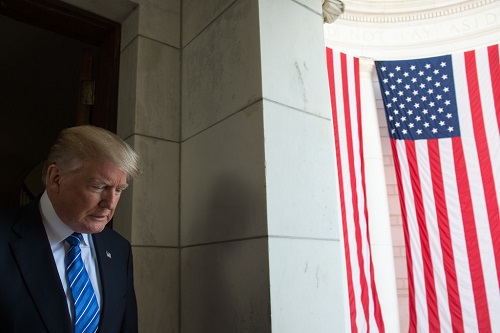DoD photo
By
Tom Arms
Global economics is a balancing act. If one side of the scales moves up, the other side goes down.
This truism was well-demonstrated by the recent volatility in the world’s stock markets.
Only a few weeks ago the IMF forecast the best year for economic growth in ten years—3.9 percent.
Two weeks later world stock markets plunged. They recovered but left a crowd of nervous investors in their wake. The markets are concerned with profits and it is one of life’s economic ironies that growth can hit profits.
The drop started in New York. This is logical because an unpredictable president should lead to a volatile market. Donald Trump’s economic policies have in the short term, at least, been a success. American unemployment is now down to 4.1 percent. And growth is up to 2.6 percent.
Full employment is reckoned to be 5 percent of the labour market. Below that and economists reckon you need to import workers in order to maintain growth. Trump’s immigration policies are doing the opposite. If the country does not import workers then the law of supply and demand will push up wages, which is exactly what is happening.
Higher wages means higher corporate costs which means less profits which is reflected in the share prices.
This is why when the markets opened in Asia they plunged even further and faster—five percent down compared to 4.8 percent in the US. Unemployment in Japan is 2.8 percent, China 3.1 percent and South Korea 3.3 percent.
It also helps to explain why the European markets dropped less than 2 percent later in the day. Unemployment in the Eurozone is 8.7 percent.
There were some other items that caused the scales to tip. Wage inflation fuels general inflation which the central banks usually correct by increasing interest rates. These have been at record lows. In Japan investors in treasury bonds receive only 0.07 percent interest. All the central banks have said rates are going up.
This means two things: It will become more expensive for companies to borrow money (which again hits profits) and investors will start to shift cash from shares to government bonds and banks.
Finally there is government spending, especially in the United States where the Trump Administration is dramatically increasing spending to cover its disaster relief bill, anti-immigration costs and a huge jump in the defence budget. Next week the White House is expected to announce that it will spend up to $2 trillion on improving America’s infrastructure.
At the same time, the Trump Administration has dramatically cut taxes. This means that there is a strong likelihood that the US government will need to borrow more, which—because of the supply and demand law—will lead to higher interest rates and draw more cash away from the financial markets.
Trump hopes that the increased deficit will be offset by increased tax revenue from corporate growth. This is the Holy Grail of government economics and goes a long way to explaining jangled market nerves.
The US is not alone. Japan, South Korea and Russia are all increasing their defence budgets because of the tense international situation. Both China and Russia have recently indicated the start of a new—and expensive—nuclear arms race after Trump’s recent Nuclear Posture Review called for more and better ICBMs and the development of a new generation of low yield nuclear weapons.
In Europe they have suffered nearly ten years of German-imposed austerity which has kept the economies of Greece, France, Italy, Spain and Portugal just on the right side of the bankruptcy courts. This looks set to change. The newly agreed German coalition government has resulted in a Social Democrat in charge of the Ministry of Finance and the Social Democrats plan to loosen the purse strings.
German Social Democrats also have the foreign affairs portfolio and are marching in step with French President Emmanuel Macron. He wants to move further and faster towards European integration and the development of a European defence force. All of which costs money.
The world forecasts remain good, but the scales are also delicately balanced.
Tom Arms is the editor of LookAheadnews.com. Sign up now for the weekly diary of world news events.
LookAhead Radio World Report for week commencing 12 February 2018:
Tom Arms
I am a journalist, entrepreneur and historian with extensive experience in print, web and broadcast journalism. I started as a diplomatic correspondent, wrote several books (The Falklands Crisis, World Elections On File and the Encyclopedia of the Cold War), and then in 1987 started my own business (Future Events News Service, www.fensinformation.com) which over 25 years established itself as the world and UK media’s diary. Our strapline was: “We set the world’s news agenda.” I sold FENS in December 2012 but retained the exclusive broadcast rights to all of FENS data. To exploit these rights I set up LookAhead TV which produces unique programmes which “Broadcasts Tomorrow Today” so that viewers can “Plan to Participate.” LookAhead has appeared regularly on Vox Africa, Radio Tatras International, The Conversation and Voice of Africa Radio.
In addition to being a syndicated broadcaster and columnist on global affairs, Tom is also available for speaking engagements and can be contacted on Twitter, Linkedin and email: [email protected].



No Comments Yet!
You can be first to comment this post!